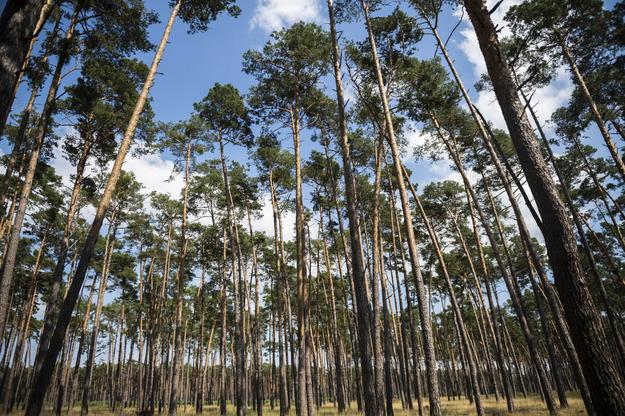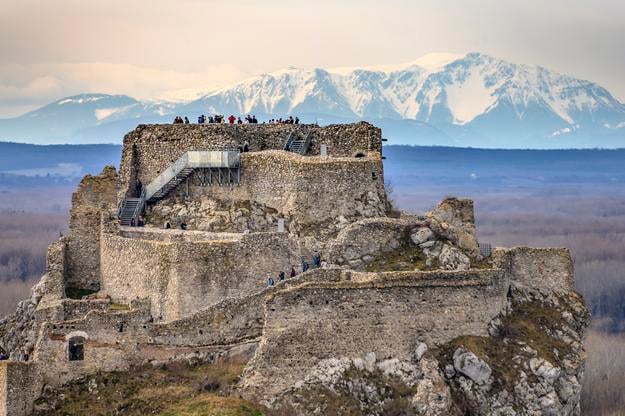Good evening. Here is the Friday, April 11 edition of Today in Slovakia - the main news of the day in less than five minutes.
Slovakia's migration policy fails to address labour gaps and demographic decline, says official auditor
Slovakia lacks a clear integration policy for migrants, according to the Supreme Audit Office (NKÚ) in a report published earlier today. This weakens its ability to address demographic changes and labour shortages, the audit body concludes.
Slovakia faces issues such as poor coordination between institutions, a lack of reliable data, and unclear goals in its migration strategy. This situation undermines the potential benefits of integrating foreign workers – something which might otherwise fill gaps in the labour market and help bolster the finances of the old-age pension system.
Integration policy lacks oversight
Lack of central authority: No single institution oversees integration policy, hindering coordination.
Need for a coordinator: A central body is essential to manage, implement and assess integration efforts.
Coordination challenges: Ministries have tended to work independently, complicating the effective implementation of the policy.
The current integration policy, dating from 2014, lacked clear goals, timelines and measurable indicators, which led to ineffective implementation. Over time, the policy became fragmented, with different ministries managing actions independently, resulting in inconsistent outcomes, the auditor says.
The absence of central coordination prevented any cohesive strategy, making it impossible to track progress or assess effectiveness. In 2017, the government abolished the obligation to report on the implementation of the policy, further diminishing transparency and oversight. Despite plans for an update under a different strategy, this has not been carried out, leaving the policy outdated and ineffective.
Finances:
The Labour Ministry funds integration measures for foreign nationals through the state budget and European funds, including the Asylum, Migration and Integration Fund (AMIF) and the European Social Fund.
Between 2021 and 2023, over €59 million was allocated, but only €34 million was spent. Additionally, the Labour Ministry invested in projects supporting the integration of Ukrainian refugees after 2022, with €614,664.49 spent on activities such as developing materials and organising events.
Other countries, like Canada and the UK, have shown that the effective integration of migrants can boost economic growth and reduce public finance pressures. Slovakia, however, has not conducted similar analyses, instead adopting strategic documents and measures that often lack real impact. As a result, Slovakia ranks poorly in the global World Talent Ranking and struggles to attract highly qualified workers through its "blue card" scheme.
The Blue Card is a residence and work permit for highly skilled workers from non-EU countries, allowing them to live and work legally in an EU member state. However, it has not been widely used in Slovakia.
Between 2021 and 2023, only 62 Blue Cards were issued, indicating low demand. Compared to other EU countries, Slovakia lags behind in attracting highly skilled workers through this scheme.
Employment of third-country (i.e. non-EU) nationals in Slovakia, by profession:
The highest number in December 2023 was for machine and equipment operators and fitters, almost 30,000.
Next were helpers and unskilled workers, nearly 15,000.
Qualified workers and craftsmen, service and trade workers, and specialists numbered more than 5,000.
The fewest were legislators, executive managers, and qualified workers in agriculture and forestry.
To compete in the global talent market and address its demographic challenges, Slovakia needs a clear and active integration policy, the auditor concludes. Without it, the country risks losing out on potential sources of economic growth. The NKÚ recommends that the government revise its integration policy, focusing on clear long-term goals, prioritised areas, and better coordination.
MORE STORIES FROM THE SLOVAK SPECTATOR WEBSITE
Weekend: Running or walking, choose your favourite sport activity; art and flowers, board games, and even Bible-based theatre performances – pick your favourite weekend activity and enjoy the ride!
Good news: The Bratislava Marathon celebrated its 20th anniversary with a record turnout on Sunday, 7,000-year-old artefacts were discovered near Piešťany, and Hollywood has come to Kysuce. These are this week’s feel-good stories to brighten your day.
Celestial bodies: Get ready for a "pink moon" this weekend, a stunning celestial event marking the fourth full moon of 2025. Not only is it a "micromoon", it also sets the date for Easter!
Travel: Bojnice is quickly becoming a mountain biking hotspot, offering five challenging trails, Slovakia's only skill park, and the potential to host national competitions.
Opinion: There are some unsettling parallels between the rise of far-right nationalism in Slovakia and India: both countries have witnessed a rise in authoritarian government, ethnic chauvinism and the marginalisation of minorities.
If you like what we are doing and want to support good journalism, why not buy our online subscription with no ads – we'll send a print copy of The Slovak Spectator monthly edition to your home address in Slovakia. Thank you!
FEATURE STORY
Ice cellar café and beyond: What the Záhorie region has to offer
Did you know that far from the better known Low and High Tatras, but much closer to Bratislava, is the Záhorie region – a hidden gem with huge tourism potential? From the cosy Pajštúreň, an ice cellar café, to the historic Habánsky Dvor in Veľké Leváre, Záhorie boasts picturesque landscapes, a rich history, and an expanding network of cycling trails. However, its lack of accommodation and infrastructure is holding it back. Could Záhorie be Slovakia’s next big tourist hotspot? Read on to find out!
EVENT FOR THE WEEKEND
JARmok event ushers in spring at Devín Castle
Welcome spring at Devín Castle with JARmok – a playful combination of words ('jar' means spring; 'jarmok' is market) that perfectly captures the spirit of the event. Set against the magical backdrop of Devín Castle, known for its breathtaking views over the Danube and Morava valleys, this spring fair offers something for everyone, including local and historical products, and delicious refreshments. For more about this and other events, read here.
IN OTHER NEWS
Car production in Slovakia is facing challenges not only due to US tariffs but also because of rising costs, experts warn. Slovakia's manufacturing costs are now higher than those in other countries, such as the Czech Republic, making it harder to secure new contracts. Europe has an oversupply of car production capacity, with sales dropping from 13 million to 10 million. US tariffs have already impacted supply contracts, especially for countries like the Czech Republic, more affected due to trade relations with Germany and China. The industry is struggling with global challenges like the green and digital transformations and protectionism. (Sme, TASR)
Former health minister Zuzana Dolinková (Hlas) abolished public health insurance dental benefits a year ago, which met with significant criticism from both patients and dentists. Now, the benefits are returning in a more limited form. Insurers Dôvera, Všeobecná Zdravotná Poisťovna and Union have announced which services they will reimburse. However, they mostly no longer cover cavity repairs or other procedures, only dental hygiene. The Health Ministry, under the leadership of Kamil Šaško (Hlas), has set a limit on benefits, allowing insurance companies to spend no more than 0.5 percent of premiums – i.e. health contributions and state insurance payments – on dental benefits. According to the insurers, this is about half of what they used to allocate for benefits in the past. (Sme)
Slovakia is setting up a monitoring centre to manage foot-and-mouth disease after recent outbreaks. Interior Minister Matúš Šutaj Eštok (Hlas) confirmed that there have been no new outbreaks but warned of ongoing risks. Agriculture Minister Richard Takáč defended the culling of livestock at a farm in Dolný Štál to prevent a further spread. Authorities are closely monitoring the situation, with the continuation of preventive culling. (Sme, TASR, SITA)
Trams in Petržalka will run slower tomorrow morning, Saturday, April 12. Starting at 08:00, DPB, the municipal transport company, will measure the parameters of the overhead power lines. On Monday, high-speed tests will take place, with trams not stopping during the tests. Safety at locations where the track intersects with roads or pavements will be ensured by the city police and the contractor, according to Bratislava City Hall. (Denník N)
Prime Minister Robert Fico cancelled his participation in a planned interview involving former Czech president Miloš Zeman on private news channel TA3 earlier today. According to Zeman, the reason was Fico's health. Zeman claims that Fico felt unwell due to the effects of injuries he incurred during the attempt on his life last May. The TA3 host, Branislav Král, explained the cancellation by stating that the prime minister had other work commitments; Zeman disputed this explanation. Zeman had met Slovak President Peter Pellegrini earlier. (Denník N)
The price of pork has increased by over 13 percent in the last two weeks, according to the Tauris meatpacking company, with further rises expected. The company attributes this to foot-and-mouth disease and the US-China trade war. "We are currently not purchasing Slovak meat, instead focusing on pork from the Czech Republic for safety reasons," said Tauris CEO Richard Duda. The trade war has primarily affected pork prices, as low pig supply and rising demand have been exacerbated by escalating US-China tensions. This has hindered American pork exports to China, leading to a surge in European exports. (Denník N)
WEATHER FOR THE WEEKEND: It will be mostly cloudy, with occasional showers in some areas. Sunday will start off clearer, but cloud cover will gradually increase throughout the day, with showers expected in the west. Overall, it will be warm, with daytime temperatures ranging from 15°C to 22°C. (SHMÚ)
WEEKEND PARTY TIME: This weekend, Estera, Aleš and — last but not least — Justina are marking their name days. Don’t forget to send them your best wishes: Estera on Saturday (12 April), Aleš on Sunday (13 April), and Justina on Monday (14 April).
Thank you for subscribing and reading. It means a lot to us.
P.S. If you have suggestions on how our news overview can be improved, you can reach us at editorial@spectator.sk.
Follow The Slovak Spectator on Facebook, LinkedIn and Instagram(@slovakspectator).


![The [fjúžn] festival is Slovakia's largest multicultural event celebrating diversity through concerts, exhibitions, literature, theatre, film, workshops and more.](https://image.smedata.sk/image/w625-h0/1f016f66-4075-61b2-a520-9758c53d3cc3.jpg) The [fjúžn] festival is Slovakia's largest multicultural event celebrating diversity through concerts, exhibitions, literature, theatre, film, workshops and more. (source: Facebook/[fjúžn])
The [fjúžn] festival is Slovakia's largest multicultural event celebrating diversity through concerts, exhibitions, literature, theatre, film, workshops and more. (source: Facebook/[fjúžn])
 The distinctive pine forests of Záhorie, pictured here near the Malacky military zone. (source: Jaroslav Novák/TASR)
The distinctive pine forests of Záhorie, pictured here near the Malacky military zone. (source: Jaroslav Novák/TASR)
 Devín Castle (source: Tomáš Hulík)
Devín Castle (source: Tomáš Hulík)
 Slovak tennis player Viktória Hrunčáková celebrates her victory against Rebecca Munk Mortensen from Denmark in the opening singles match of the Slovakia vs Denmark tie in Group C of the Billie Jean King Cup qualifiers.(TASR) (source: Michal Svítok)
Slovak tennis player Viktória Hrunčáková celebrates her victory against Rebecca Munk Mortensen from Denmark in the opening singles match of the Slovakia vs Denmark tie in Group C of the Billie Jean King Cup qualifiers.(TASR) (source: Michal Svítok)